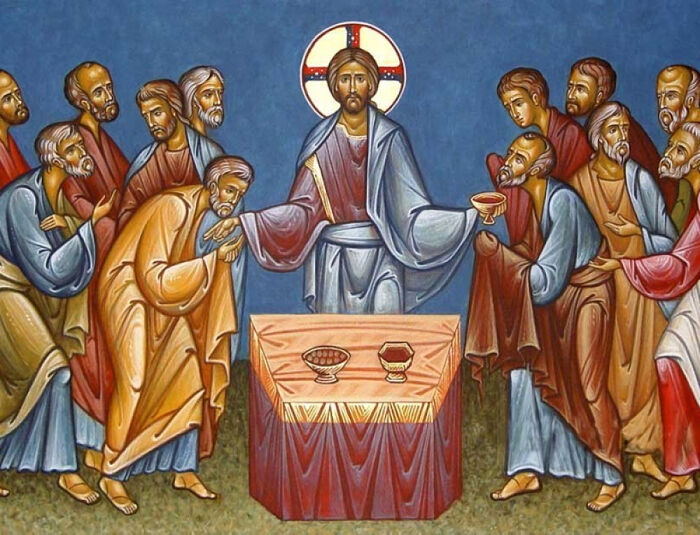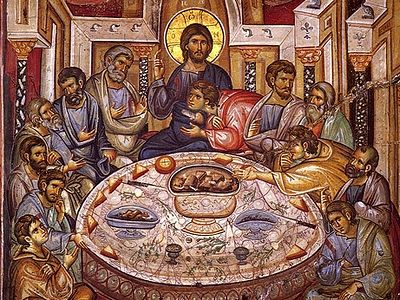 Photo: acathist.ru
Photo: acathist.ru
The most important place in the body of church services is occupied by the service we call the  A Brief Historical Look at the LiturgyThe Rite of Divine Liturgy in its most basic form—reading the Holy Scriptures, prayers for the living, prayers over the Gifts, and finally, Holy Communion—had already taken shape in the first century.
A Brief Historical Look at the LiturgyThe Rite of Divine Liturgy in its most basic form—reading the Holy Scriptures, prayers for the living, prayers over the Gifts, and finally, Holy Communion—had already taken shape in the first century.
“>Liturgy. Liturgy is a Greek word that means communal service. Sometimes it signifies service to our neighbor, charity, and sometimes service in the Altar. Divine Services have as their goal to bring us closer to God, to bring us closer to Him in prayer. However, the greatest manifestation of closeness, the Lord’s presence among the faithful, “Theosis” of man and nature is accomplished in the Mystery of the Eucharist, which is at the center of the life of the Church.
The Eucharist was established by the Lord Jesus Christ Himself during the  Holy and Great ThursdayHow many now say, I would wish to see His form, the mark, His clothes, His shoes. Lo! thou seest Him, Thou touchest Him, thou eatest Him. And thou indeed desirest to see His clothes, but He giveth Himself to thee not to see only, but also to touch and eat and receive within thee. Let then no one approach it with indifference, no one faint-hearted, but all with burning hearts, all fervent, all inspired.
Holy and Great ThursdayHow many now say, I would wish to see His form, the mark, His clothes, His shoes. Lo! thou seest Him, Thou touchest Him, thou eatest Him. And thou indeed desirest to see His clothes, but He giveth Himself to thee not to see only, but also to touch and eat and receive within thee. Let then no one approach it with indifference, no one faint-hearted, but all with burning hearts, all fervent, all inspired.
“>Mystical Supper He hosted. Jesus Christ assembled His disciples on the night when he was to be betrayed and given over to suffering, torment, crucifixion, and death. He assembled His disciples as their head, as the eldest, although in terms of age He was not their elder. He performed the ritual of the meal according to the pattern accepted by the people in the Old Testament Church, but with one unusual difference: when He broke the Bread, and when he elevated the Cup after having read the special prayers of thanksgiving to God for everything, He said to his disciples: Do this in remembrance of Me. The Bread is My Body, and this Wine is my Blood. When you remember Me in this manner, you will be eating of My Body and drinking of My Blood. And whosoever will do that, will abide in Me, and I will abide in him, forever.
During the Eucharist, we remember everything that happened to Christ: His Incarnation, His entire life, Golgotha, the Resurrection, and the Ascension. However, when we remember all of this in the symbolism of the Divine Liturgy, it all happens anew! My Father worketh hitherto, and I work (John 5:17), and this activity never ends. The Mystery, the Sacrament, of the Holy Eucharist rests in the fact that is does not consist only of our commemorations.
The Liturgy imparts a real, actual communion with God, illumining each participant, so that in a profound mystery, during each Liturgy the bread and wine that had been brought into the Altar is transformed into the Body and Blood of Christ. Also, at the moment each of the faithful communing of the Very Body and Very Blood of Christ, is really, actually, not merely intellectually or seemingly, united with God Himself. During the  We Have to Go to Liturgy, Even if We Stand There Like StumpsWe have to go to Liturgy, even if we stand there like stumps. Some will say: “I’m not how I should be. I don’t understand any of it. My mind can’t concentrate there.” But go, no matter what. One elder said: “When you stop into a perfume store, your clothes smell fragrant after you leave, even if you didn’t buy anything.” This is what happens, he says, when you go to Liturgy.
We Have to Go to Liturgy, Even if We Stand There Like StumpsWe have to go to Liturgy, even if we stand there like stumps. Some will say: “I’m not how I should be. I don’t understand any of it. My mind can’t concentrate there.” But go, no matter what. One elder said: “When you stop into a perfume store, your clothes smell fragrant after you leave, even if you didn’t buy anything.” This is what happens, he says, when you go to Liturgy.
“>Liturgy, God’s fulfillment of His promise to be among men accomplishes man’s fullest enlightenment.
Here God’s unique action transpires, bringing Divine power into this world; and each of us partakes of that power. It enters into our hearts and acts through us in everything we do. That power of God imparts to everything you do, however seemingly insignificant, enormous importance, profundity; in this lies the spiritual meaning of Orthodoxy. Through everything that a Christian does in this world, participating worthily in the Eucharist, God’s power enters the world, the power that transforms the world that blesses the world, remakes the world. It does so even though the world does not understand it. The world does not even know about it. That is what the Eucharist is! That is why from the earliest days the Eucharist—the sacrifice of thanksgiving, the breaking of bread—has been the central fact of Christian life. The Eucharist is the greatest expression of Christian unity, of life in a single Body, the Single Holy Church of Christ. The Mystery is the source of that unity. We are a single Body – His Body. We all—living and dead—are one. In the Altar, the priest reads the words, “And all of us who partake of the one Bread and the one Cup do Thou unite one to another…” Everyone standing here, the living and the dead, the Church on earth and the glorified Church “which hath One Head.”
Out of the need, the poverty, the darkness of my ego, I approach the Divine Mystery and come into the light. “Thine light hath entered and illumined my darkness.” In those moments, we, still living here on earth, already enter into His grace-filled life, for He comes to us and “males our abodewith Him.” (John 14: 23)
During the Eucharist, the central, most important event takes place: Christ appears in our midst. Where two or three are gathered together in My Name (and it was just so that Christians gather together during the Eucharist), there I am in their midst. There Christ is in our midst with all the power of His compassionate love, able to decisively grant each of us everything that we need, and so that the seed of God’s word that enters into our soul when we hear the Gospel, the Good News, might not be wasted and perish, but might grow in every heart. Amid the reign of anarchy and chaos in this world, the Mystery of the Eucharist, the Divine Liturgy, is the anticipation of a different world, a different Kingdom, “where is the light of God.” The Eucharist is the link connecting the present and the future, our current state with the glorious Transfiguration to come.
In the Eucharist, time disappears, time enters into eternity. And we belong to and experience/take part in eternity. Because everything we remember as having been—Jesus Christ’s embarking on his mission to preach, the Mystical Supper—this in our intellect WAS, but in God IS. Everything that was, is. That is something impossible for the mind to comprehend.
Jesus Christ’s death is a sacrifice. There is His death, Resurrection, and Ascension. It all was and is. For us, it is yet to come, but for the Lord, it already is. And what is yet to come? Our own death, our own resurrection, our own ascension. But it already… is. During the Liturgy, we are in the past, the present and the future, and that is something that is not a concept, not a fantasy, not ideas, but actual reality. Such is the Mystery of the Eucharist.